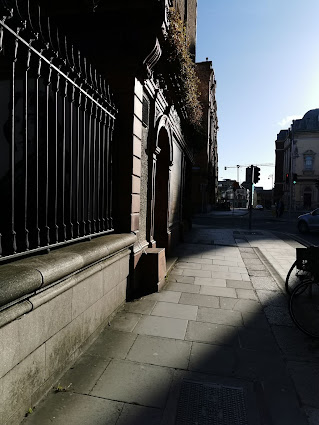A MAYFLOWER STORY
Doug Dunn
I had never much wanted to visit Plymouth.
When my friend Carmel, visiting Devon for the first time, suggested it, we
decided to go and see the Mayflower Museum. Good to do new things and I wanted
to learn a little about American history.
We enjoyed the Mayflower 400 Exhibition
commemorating its voyage from Plymouth in 1620. We read each poster display describing
the story of how a small group of people transported themselves from humble
beginnings in Nottinghamshire to Holland and then new world of America. I had
heard about the Pilgrim Fathers and I was keen to learn the origins of the
story.
After leaving the museum the guides
suggested walking out onto the cobbled New Street and by Elizabethan House,
once called London House, the offices of the London Company of Virginia. I sat
on a bench while my friend went looking for coffees. I imagined meeting one of
the pilgrim women and asking her what it was really like to be on that journey
from Plymouth ….
“My name is Mary Brewster. I was one of
the 18 women of 102 passengers on board the Mayflower in autumn 1620. Sadly
only five of us women survived the first winter. We played an important role
and should really be remembered for the part we played. When eventually we
sighted land at Cape Cod which was further north than our planned destination
of Virginia, we decided to stay where we were. The men went off exploring the
land to find a suitable place to settle and build store houses. They were
creating the beginnings of a new settlement we called Plymouth. We women stayed on board to look after the
sick and dying. We cooked and cared for the sick and young to ensure at least
some of us would survive that first winter.
By autumn the following year in 2021, I
felt a strong sense of gratitude and thanks for what my husband William Brewster
and our colony had achieved. I remember thinking back to the treacherous 60 day
voyage across the ocean in such confined conditions. The ship was only 75 feet
long and 25 feet wide. Towards the end of the voyage there were many arguments,
conflicts and we almost had an on-board mutiny. Thank God we resolved our
differences and made a written agreement in Cape Cod. It became known as the Mayflower
Compact.
That moment marked the end of an even
longer journey from my home in Scrooby in Nottinghamshire where I lived with
William, to Leiden in Holland where we lived for 12 years. Breaking away from
the Church of England and anything not in the scriptures was another courageous
journey we made and were proud of.
We sailed across from Leiden to Plymouth
in Devon after several false starts on board the Speedwell. But we had to abandon
her because it kept leaking and then pack everything onto another ship were
hired; the Mayflower. We were sailing for the first time and people here in
Plymouth probably thought we were foolhardy for wanting to sail in the autumn on
such a long journey across the Atlantic. But we did it! We sailed off into the
unknown with a ship half-full of 'strangers'. They were not of our thinking.
Then one year later, though only half of us survived the hunger, illness and
freezing winter, we were able to celebrate and give thanks to all we
achieved.
I think that Mayflower Compact was very
important. After enduring such hardship, it was time for new ways and new rules
to live by. That agreement kept our community connected and allowed us to
thrive.”
I woke up from my day-dream and remembered
reading in the museum that the pilgrim colony survived for only 70 years. But what a long lasting impression they had made
in the imagination of American people. Out of hardship and the unknown came a
new spirit for life and adventure.
In some way learning about those pilgrims
is helping me get through the pandemic.
I am learning new ways of thinking. Learning about the history on my doorstep
is a good start. And that it is a good thing to speak to strangers!
The Mayflower Compact
Having undertaken, for the Glory of God,
and advancements of the Christian faith, and the honor of our King and Country,
a voyage to plant the first colony in the Northern parts of Virginia; do by
these presents, solemnly and mutually, in the presence of God, and one another;
covenant and combine ourselves together into a civil body politic; for our
better ordering, and preservation and furtherance of the ends aforesaid; and by
virtue hereof to enact, constitute, and frame, such just and equal laws,
ordinances, acts, constitutions, and offices, from time to time, as shall be
thought most meet and convenient for the general good of the colony; unto which
we promise all due submission and obedience.


Comments
Post a Comment